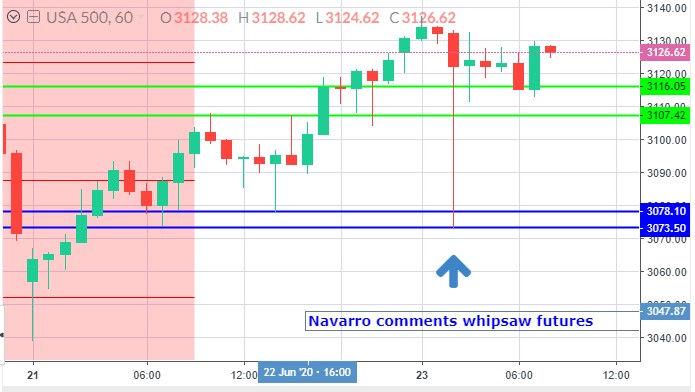
Tuesday Jun 23 2020 08:01

4 min
It’s over, it’s not over: The White House looked to be as dysfunctional as ever as Peter Navarro, trade adviser to President Trump, said the US-China trade deal was over, prompting a sharp fall in risk assets in trading during the Asian session. He was forced to retract the statement, saying it was taken out of context, before Donald Trump himself quickly tweeted:
The China Trade Deal is fully intact. Hopefully they will continue to live up to the terms of the Agreement!
— Donald J. Trump (@realDonaldTrump) June 23, 2020
The reality is of course the US-China relations are exceptionally poor, but on paper at least, the trade deal lives. The market wouldn’t like fresh open conflict on trade between the two world’s largest economies, as it would make recovery from the pandemic even slower. Navarro may speak the truth, but it’s an inconvenient truth that the White House would prefer to avoid right now. Markets are happy to nod along as long as the Fed has their back.
Overnight, equity markets were whipsawed by the comments from Mr Navarro, but Asian stocks eventually rallied. US stocks edged higher on Monday but stayed well within the recent ranges; futures were all over the place overnight.
European stocks opened firmer having slipped yesterday, again though sticking to the near-term ranges. Whilst the FTSE is trading in the range and favouring the 61.8% level over the 38.2%, the market has made a series of success lower highs that may indicate bulls are not feeling very confident about recovering the post-pandemic highs any time soon. Rallies are still lacking conviction, but dips are still being bought.
Further increases in cases across big economies make the outlook uncertain. US cases continue to surge, while South Korea says it is in the midst of a second wave that arrived sooner than previously thought. Meanwhile England is set for reopening of pubs, restaurants and more on July 4th.
In FX, the pound is higher having apparently found a near-term trough around the 1.2340 area. GBPUSD pushed up to 1.25 but hit resistance here and has retraced a little to the 1.2450 support area on the 50% retracement of the May-Jun rally. Andrew Bailey, the governor of the Bank of England, speaks today after giving some policy hints yesterday in an article in which he said the Old Lady was more likely to reduce its balance sheet before raising rates.
He also was widely reported to have said the Government could have run out of cash had it not been for the central bank, which is patently untrue, since governments which borrow and print their own currency cannot run out of money – what the Bank did was smooth out the functioning of bond and currency markets. Indeed what Mr Bailey said was not that the government would run out of money – he knows it cannot; his comments were widely misreported and misinterpreted in the press.
The euro took off higher after French PMI data went over 50, signalling expansion. The PMIs are a bit of a wonky indicator right now given they are entirely sentiment-based and ask only a narrow question – whether things are better, worse or the same as the prior month.
Given the reopening of the economy in the last few weeks, it would be very strange indeed if the PMIs were not improving – it does mean the economy is out of the woods. EURUSD drove up to 1.13 but hit resistance here and turned back.
Gold eased a little off its highs above $1760 but looks well support around $1750. US benchmark real rates – 10yr Treasury Inflation Protected Securities (TIPS) – fell again, slipping to –0.63%, the lowest level in 7 years. Crude oil was firmer above $40 and managed to make a fresh post-negative-pricing high.

